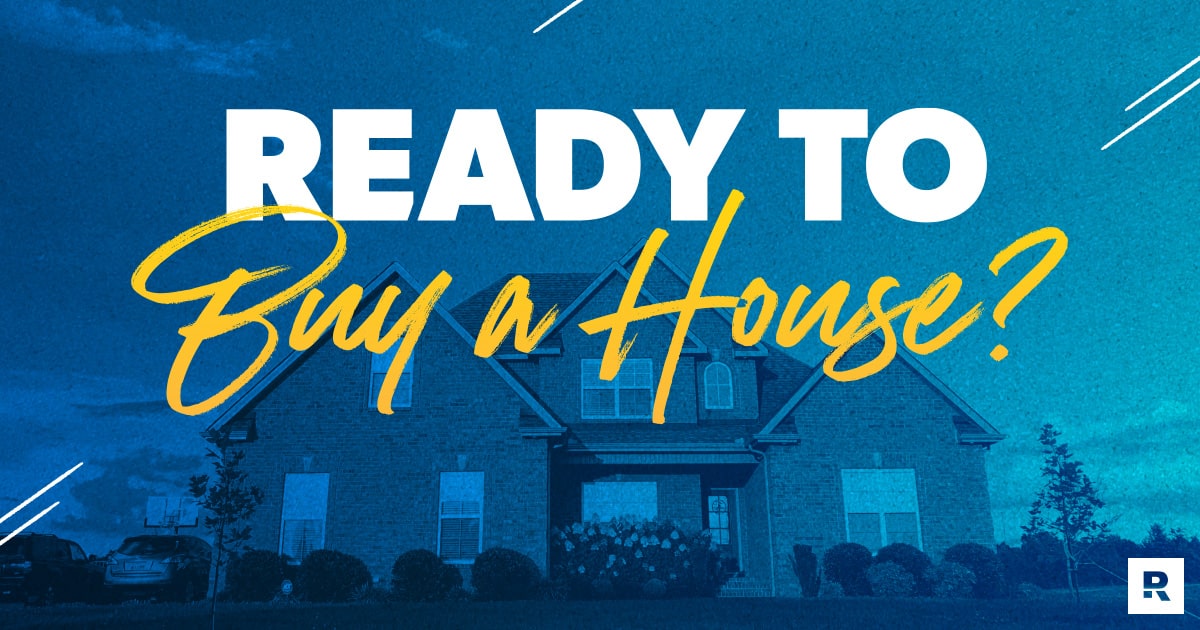
Ever heard someone say everyone should buy a house? Or that renting is a lot like flushing a whole bunch of money down the toilet every month? Yeah, we’ve heard that stuff too. And it’s nonsense! The truth is, not everyone should buy a house.
Because, if you sign the dotted line on a new home when you aren’t prepared financially and emotionally, the house will wind up being a curse instead of a blessing. It will wind up owning you instead of the other way around. When you are prepared to buy a house, though, it can be a wonderful blessing for your family and a great way to build wealth.
At this point, you’re probably asking yourself, Am I ready to buy a house? What a great question! Let’s take a look at a checklist that will help you decide if you’re ready to get the ball rolling on buying a house.
You’re Ready to Buy a Home If . . .
If you can say, “Heck, yes!” to each statement below, then pack your bags, baby—you’re ready to buy a house!
1. You’re debt-free with a full emergency fund.
The first step in making sure you’re financially ready to buy a house is paying off all your debt and saving up a full emergency fund. That’s right—it’s time to say goodbye to your credit card balance, car payments, student loans and everything else you owe money for. Then, you’ll want to build up an emergency fund worth 3–6 months of your typical expenses.
Why is it important to accomplish those goals before buying a house? First off, if you try buying a house while you have debt, it’ll be tough to save up a strong down payment since most of your extra money will be going out the door to credit card companies or Sallie Mae. And if you buy a house without an emergency fund, you’ll have a crisis on your hands when something inevitably goes wrong—think a leaky roof or a faulty HVAC unit.
So, before you buy a house, buckle down and knock out your debt as fast as possible using the debt snowball. Once debt’s a distant memory, get busy stockpiling money in an emergency fund. Then your budget will be secure and you can focus on saving up a down payment. Speaking of down payments . . .
2. You have a good down payment.
The best way to buy a home is to put 100% down (trust us, it’s possible). But if paying cash for your home isn’t in the cards for you and you want to take out a mortgage, you will need to make a good down payment.
See how much house you can afford with our free mortgage calculator!
A 20% down payment is ideal since it means you’ll avoid paying for private mortgage insurance (PMI)—a fee that insures the lender (not you) if you don’t make your mortgage payments. If you’re a first-time home buyer, a 5–10% down payment is okay, but plan to pay that pesky PMI and work on getting rid of it ASAP.
For a simple plan for how to save up a big down payment fast, download our Saving for a Down Payment Guide. Don’t forget: A bigger down payment means smaller monthly payments and a smaller loan, overall.
And by the way, the only type of mortgage you should even consider is a 15-year fixed-rate conventional loan. Going for a 30-year loan may seem like a good way to lower your payments, but it’s also a good way to pay a ton more (like, tens of thousands of dollars) in interest while you stay in debt for an extra decade and a half. You should also stay far away from FHA and VA loans, and all their pesky fees.
When you’re ready, our friends at Churchill Mortgage can walk you through getting preapproved for a 15-year fixed-rate loan.
3. You can afford monthly house payments and home maintenance.
The next sign you’re ready to buy a house is when your budget can handle house payments. Specifically, your monthly house payment should never be more than 25% of your take-home pay.
Why? When your house payment eats up more than a fourth of your take-home pay, your budget will be way too tight. Tying up that much of your income in a house payment won’t leave you enough money to put toward other important financial goals like saving for retirement. That’s what we call house poor.
So, before you pull the trigger on a new house, add up how much your monthly payment would be and make sure it won’t go past that 25% mark. Our mortgage calculator will give you a realistic look at what that number will be.
And don’t forget, your monthly payment is more than just the principal and interest on your loan. More than likely, you’ll also be paying for . . .
- Property taxes: Local governments raise money through property taxes to fund things like schools, law enforcement, fire departments and (supposedly) fixing potholes.
- Homeowners insurance: Sure, homeowners insurance adds more dollar signs to your house payment. But paying for coverage will be way less expensive than trying to replace all your stuff out of pocket if your house ever burned down. Plus, your mortgage lender will require you to have it.
- Private mortgage insurance (PMI): Remember: You can avoid PMI if your down payment is 20% or more. But if you make a smaller down payment, expect to pay around $75 a month per $100,000 that you borrow.
- Homeowners association (HOA) fees: Basically, HOA fees are for community maintenance and upgrades. If you buy a house in a community that has an HOA, you automatically become a member and will be expected to pay the fee and keep your home up to HOA standards to help increase the overall property value in that community.
With the right agent, taking on the housing market can be easy.
Buy or sell your home with an agent the Ramsey team trusts.
4. You can pay your own closing costs.
Some home sellers cover closing costs to sweeten the deal—but don’t bank on it. On average, the buyer’s portion of closing costs will be around 3–4% of your home’s purchase price.1 For a $300,000 home, that’s anywhere between $9,000–12,000 to cover items like:
- Loan origination fee
- Home inspection
- Appraisal
- Prepaid property taxes and mortgage insurance
- Title insurance
- Recording fees
- Underwriting fees
Saving 3–4% for closing costs is a good rule of thumb—just to be on the safe side. But you’ll get a better idea of what your costs will be when you receive a loan estimate form from your lender after you apply for your mortgage. Just be aware that these can change before it’s time to close on your home.
You should receive your final closing disclosure form at least three days before closing. Be sure to review it carefully for unexpected cost differences, and ask your lender to explain any charges you don’t understand.
5. You can cash flow moving expenses.
Don’t forget: Buying a house also means you’ll be moving! So make sure to have a separate pile of cash saved up just for moving expenses.
Now, getting extra manpower behind your move may be as cheap as a few pizzas to bribe your friends with trucks. But if that won’t cut it for you, or if you’ll be moving a longer distance, putting aside some money for a moving and storage company could be a great idea.
Besides the heavy lifting part of your move, here are other expenses to be ready for:
- Boxes, bubble wrap and other moving supplies
- Deposits for utilities
- Cleaning supplies
- Appliances that aren’t included in your home purchase
- Any pre-move-in upgrades like painting, new furniture and closet organization
While you wait for your closing date, get good estimates for what these costs will be—request quotes from moving companies, shop for appliances, etc. Pad your move-in budget a bit so things go as smoothly as possible, and don’t let new-home excitement cause you to overspend on items you don’t need right away.
6. You plan on staying put for a while.
Another thing to think about is whether you’re at a place in life where you’re ready to stay in your city for more than a few years. Most of the time, buying a house is a bad idea if you’re not planning to live in it for at least five years.
Why? Because it usually takes at least five years for a home’s value to grow enough to keep you from losing money when you resell it. For example, if you stay in a home for three years and its value only increases by 3% in that time, you wouldn’t even make back the money you spent on closing costs if you sold the house. Plus, unlike when you bought the house, you’d have to pay for a real estate agent’s commission.
If you’re in an area where home values have increased rapidly over the last five years and houses for sale don’t spend much time on the market, the math may work out for you to buy instead of rent. But 90% of the time, renting is the better option if you’re not planning to stick around for long.
7. You have an expert real estate agent you can trust.
It can sometimes be difficult to find a house you love that’s also within your budget, but it’s a whole lot easier when you have a top-notch real estate agent on your side. Plus, working with a buyer’s agent brings two other big benefits:
- Saving money: In most cases, the home seller pays the commission for your agent—so you pay nothing to get expert help! Even better, a buyer’s agent can save you thousands of dollars on your dream home by fighting for your best interests at the negotiation table.
- Saving time: Without an agent, you’ll have piles of paperwork to wade through. Life’s too busy for that! Let an expert who knows all of the laws and regulations specific to your city take care of the red tape for you.
Next Steps
- Make your down payment savings goal part of your budget with the EveryDollar budgeting app.
- Connect with a RamseyTrusted real estate agent who has tons of experience helping buyers like you get the home of their dreams. It’s super easy to connect with one—it takes just a few minutes.


